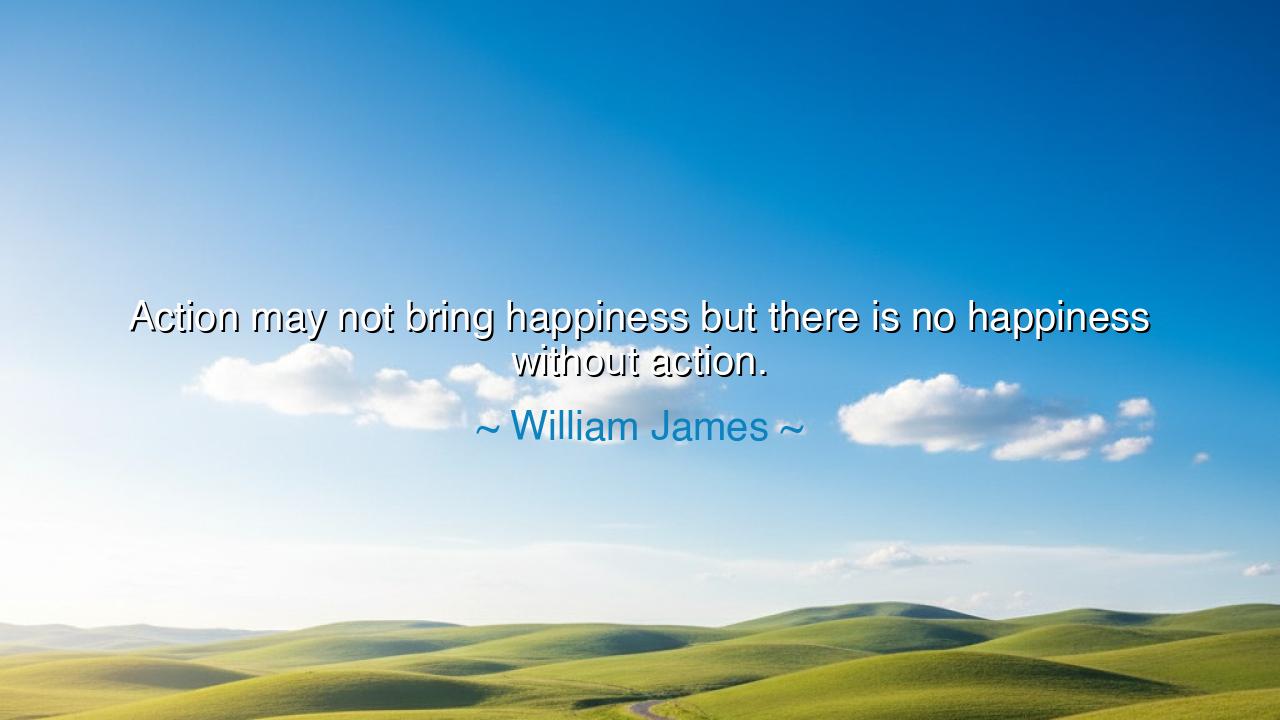
Action may not bring happiness but there is no happiness without






The philosopher William James, father of modern psychology and sage of human will, once declared: “Action may not bring happiness but there is no happiness without action.” In this single sentence, he struck at the heart of the eternal human dilemma—the tension between thought and deed, between desire and movement. James understood that the soul, left stagnant, grows restless; that to live well is not merely to dream, but to act. He did not promise that all deeds would bring joy, but he revealed a deeper truth: inaction is the death of the spirit, and only through motion, through striving, through engagement with life, can the flame of happiness be kept alive.
The meaning of his words is both humbling and empowering. Happiness, as James saw it, is not a gift bestowed by chance, nor a reward for contemplation alone—it is the fruit of participation. A man may sit surrounded by comforts and still know despair; another, toiling with purpose, may find his heart filled with peace. For happiness is not in the circumstance but in the movement of the soul toward something meaningful. The hands that build, the voice that speaks, the heart that gives—all discover in their exertion the quiet joy of existence. It is not the certainty of success, but the willingness to act, that brings light into the corridors of the human heart.
The origin of this philosophy lies deep within William James’s own life and teachings. As a thinker, he struggled long with paralysis of the will—moments when intellect overpowered instinct, and reflection became a cage. In his writings, especially in The Principles of Psychology and The Varieties of Religious Experience, he observed that happiness and mental health depend upon engagement with life, upon the alignment of belief and action. His was not a detached philosophy, but a lived one. Having wrestled with doubt and despair, he came to see that action itself—even imperfect, uncertain action—is the cure for the mind’s despair. To wait until one “feels ready” is to surrender to inertia; to act is to awaken the soul.
Consider the story of Florence Nightingale, the “Lady with the Lamp,” who found herself tormented by the purposelessness of privilege. Surrounded by luxury, she felt only emptiness—until she chose to serve. When she acted—tending to the wounded and the dying during the Crimean War—her life ignited with meaning. The work was harrowing, filled with suffering, disease, and despair. Yet she wrote later that she had found peace not in rest, but in service. Nightingale embodied James’s wisdom: that happiness is not the absence of struggle, but the presence of purpose. Through action, she transformed her sorrow into strength and her compassion into history.
The lesson of James’s insight applies to every soul that hesitates before the unknown. The one who seeks happiness through waiting—waiting for the right time, the right feeling, the right certainty—will wait forever. Life yields its joy not to the dreamer who lingers, but to the doer who dares. Even failure, in the eyes of the active soul, becomes a teacher, for it proves that life is still unfolding, that hope has not died. As the ancients taught, the gods favor movement; the stagnant pool breeds decay, but the flowing river stays alive. Action is the current of existence itself.
Yet there is wisdom in James’s first caution: “Action may not bring happiness.” For not all deeds are noble, nor all labors wise. Action without reflection becomes chaos, and movement without meaning exhausts the soul. Thus, his teaching is a call for purposeful action, for deeds rooted in conscience and vision. The happiness he describes is not the fever of ambition, but the serenity of alignment—when thought, will, and act move together as one. This harmony of being, born through the union of mind and motion, is the deepest joy a human can know.
The lesson we inherit, then, is simple yet eternal: Do not wait for happiness—create it through action. Let your hands shape, your heart serve, your mind commit. Each act, however small, draws you closer to the fullness of life. Work not for reward, but for the dignity of the striving itself. When you feel the weight of doubt, remember that motion itself is healing; when despair whispers, silence it with a single step forward.
So let it be known to all who come after: happiness does not descend upon the idle like sunlight through glass—it is forged in the fires of effort, courage, and engagement. As William James teaches, the joy of living belongs to those who dare to live, not merely to think of living. For though action may not always bring happiness, the absence of action guarantees emptiness—and in every purposeful deed lies the promise of awakening, the quiet triumph of a soul fully alive.






AAdministratorAdministrator
Welcome, honored guests. Please leave a comment, we will respond soon